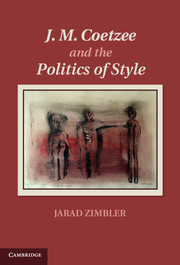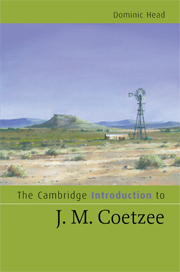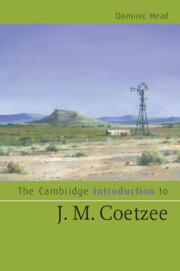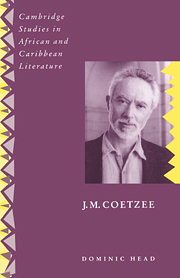J. M. Coetzee and the Politics of Style
J. M. Coetzee's early novels confronted readers with a brute reality stripped of human relation and a prose repeatedly described as spare, stark, intense and lyrical. In this book, Jarad Zimbler explores the emergence of a style forged in Coetzee's engagement with the complexities of South African culture and politics. Tracking the development of this style across Coetzee's first eight novels, from Dusklands to Disgrace, Zimbler compares Coetzee's writing with that of South African authors such as Gordimer, Brink and La Guma, whilst re-examining the nature of Coetzee's indebtedness to modernism and postmodernism. In each case, he follows the threads of Coetzee's own writings on stylistics and rhetoric in order to fix on those techniques of language and narrative used to activate a 'politics of style'. In so doing, Zimbler challenges long-held beliefs about Coetzee's oeuvre, and about the ways in which contemporary literatures of the world are to be read and understood.
- Presents the first book-length study of the distinctive style of J. M. Coetzee's early and middle fictions
- Offers a detailed account of Coetzee's South African literary contexts
- Provides a significant contribution to what has been called the 'postcolonial aesthetic'
Reviews & endorsements
'Zimbler has taken a relatively traditional genre - the single-author monograph aimed at specialists - and armed it with something invigorating: a desire, first, to foreground the compositional concerns of a writer whose critics don't always attend to his handling of form; and, second, to reach beyond Coetzee aficionados by demonstrating assiduous treatments of diction, pace, and timbre that will appeal to anyone interested in contemporary writing.' David James, Public Books (publicbooks.org)
'In this accessible, elegant study, Zimbler achieves his stated goal, to 'analyze and explain the aesthetic decisions that produced and gave meaning to [Coetzee's] bare prose' … Recommended. Lower-division undergraduates and above.' E. R. Baer, Choice
'This erudite, wide-ranging, intellectually ambitious work makes a significant contribution not only to Coetzee studies but also to postcolonialist studies and contemporary fiction studies more broadly … The insistent but unforced attention to what Zimbler calls 'those subtle shifts in tense and tone, vocabulary and register' in order to make visible 'a politics of style' will inform other literary critics grappling with how not to reduce the aesthetic qualities that help constitute politically charged writings both within and beyond postcolonial studies.' Chair's Report, 2016 University English Book Prize
'… fascinating and innovative … contribution to Coetzee scholarship and South African literary studies.' Lucy Valerie Graham, The Cambridge Quarterly
'Zimbler's monograph lends a new dimension to Coetzee studies and invites us to take his approach to others of Coetzee's novels and to the study of other authors, and to incorporate relational analyses in narratological inquiries. This valuable contribution to Coetzee criticism thus holds interest also for scholars in postcolonial literatures and narrative theory.' Alexandra Effe, English Studies
Product details
August 2014Hardback
9781107046252
242 pages
229 × 152 × 17 mm
0.53kg
2 tables
Available
Table of Contents
- Introduction
- 1. Neither progress, nor regress
- 2. New dimensions
- 3. Lyrical situation and rhythmic intensity
- 4. Native traditions and strange practices
- 5. From bare life to soul language
- Conclusion.








